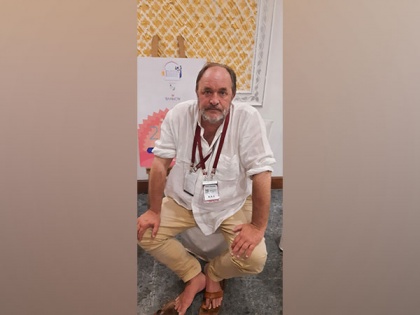Writing on historical non-fiction has become mainstream than 3 decades ago: William Dalrymple
By ANI | Published: March 13, 2022 11:48 AM2022-03-13T11:48:57+5:302022-03-13T11:55:13+5:30
William Dalrymple, Scottish writer, historian and co-director of Jaipur Literature Festival (JLF), said on Saturday that the writing on historical non-fiction has become "much more mainstream" compared to three decades ago when he started writing on the genre.

Writing on historical non-fiction has become mainstream than 3 decades ago: William Dalrymple
William Dalrymple, Scottish writer, historian and co-director of Jaipur Literature Festival (JLF), said on Saturday that the writing on historical non-fiction has become "much more mainstream" compared to three decades ago when he started writing on the genre.
Talking about how the landscape for historical non-fiction in India changed since he started writing, he toldin an interview, "The landscape for historical nonfiction was unusual in India. In India, through various parts of history, they seem to be only Marxist historians for many years, during the 60s and 70s. And Marxist historians believe in historical processes and economics. They don't believe that human beings drive history; they believe that the unseen forces do. And therefore, history in India seemed to be remarkably free of people that were all about historical processes."
They weren't reading so much about Mughal emperors so much as compared to the writings about agricultural uprisings in rural Indian villages. And also, as a result of which, indeed, historians were writing quite dense and abstruse material only for each other, he added.
"There was no equivalent to the sort of persons, like Simon Schama, or Stephen Greenblatt, they were top brand academic historians, were winning prizes, literary prizes for their nonfiction, and you had an odd situation whereby India was leading the world, when I arrived here, in fiction," he stated.
The country had Arundhati Roy, Kiran Desai, Amitav Ghosh, Vikram Seth. Indian fiction was, you know, the best of the world, it would have won any literary test that you wanted, but Indian nonfiction was in its state than in its infancy, he stated.
"And now, in a sense, I should say I probably built my career in that space, when no one else was writing serious, seriously researched academically, top-notch history, which was also readable and written in a manner that was meant to be read," he further stated.
"Now, there's lots more going on. I'm going to be on this evening with Upinder Singh who's just written a wonderful collection, basically aimed at the general audience, not dumbed down but made accessible. And many other writers are doing the same," he said while talking about a panel discussion on ancient Indian: Culture of contradictions at Jaipur Literature Festival, 2022.
"And this morning we had a fantastic session here with Anirudh Kanisetti, I think, the most remarkable historical debut for many years. And Manu S Pillai is just amazing writer, lots of people now writing really top-notch stuff," he added.
Stark historical nonfiction is much more mainstream now in the country than it was before I started writing. And I mean, in a sense, he is quite grateful that it wasn't there earlier in the day, he further added.
While talking about his upcoming book The Golden Road and how did COVID-19 lockdown shaped the evolution of that book? He said that the lockdown totally shaped it.
"I'm not quite lucky with my timing in that. I just came back from a massive international book tour for The Anarchy. I think we launched the book in...let me get the timing right. I think it was 2019. We launched it in the autumn in September," he added.
"And I went around Europe, America, India, and Australia, New Zealand, and I was exhausted. I didn't want to have another hotel room ever again. I was sick of minibars, room service and I want to be at home with my family... when I started looking and I didn't even know what my next book was tend to be and by the time the first lockdown ended, I had a book proposal completed and the first sort of idea drafted out..." he added.
There will be professionals who have benefitted from the lockdowns, one of them are writers. Our enemy is distraction, he stated.
"Yeah, so I'm starting next month, I've done three years, around two and a half years research, and I'm beginning writing in April. Just terrifying," he stated.
Talking about his forthcoming podcast Empires, he said, "It is going to be called Empires. And I mean, our specialty is to write about the British Empire in India. But we are going to extend it to include other empires of the past such as the Cholas, empires basically allow you to do quite a great chunk of world history, Non-European history."
The 15th edition of Jaipur Literature Festival 2022 is taking place from March 5 to March 14 in a hybrid format with its on-ground events from March 10 to March 14 at Clarks Amer, Jaipur, Rajasthan.
( With inputs from ANI )
Disclaimer: This post has been auto-published from an agency feed without any modifications to the text and has not been reviewed by an editor
Open in app